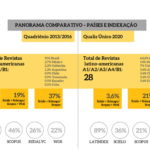Albert Manke, Center for Inter-American Studies, Bielefeld University, Germany
Victor Thives, Institute of International Relations, University of Brasilia, DF, Brazil

Albert Manke
Professor Albert Manke, from Bielefeld University, investigates an undisclosed subject of the global Cold War, namely the effects of China’s Communist Revolution on Cuba’s Chinese community, in his article “The impact of the 1949 Chinese Revolution on a Latin American Chinese community: shifting power relations in Havana’s Chinatown”, published in RBPI (Vol. 61, No. 2). His findings show that the Chinese community in Cuba was closely related to the social, political and economic situation of both the Chinese and the Cuban Revolution.
According to the historian Herbert Klein (2018), the historical understanding is of paramount importance to fathom the current debates and the major issues facing the modern world. Trying to grasp China’s economic and geopolitical growth as well as its implications to the current world order is one of the main challenges faced by International Relations scholars these days.
If China’s impact in Latin America was originally constrained by Washington’s Cold War policy, after the Cuban Revolution Beijing found a breach through which it could influence the region. Departing from new archival sources and interviews, the author sheds light on the entangled developments on local, national and transnational levels, stressing the varied layers of power relations in the Americas. Professor Manke was interviewed by Victor Thives, member of the editorial team of RBPI, regarding his views on topics related to his work.
1. In your article, you point out the contradictory attitude adopted by the Cuban government towards the PRC in the period right after the 1959 Revolution. From a preliminary analysis, this position can seem counterintuitive, since the PRC could have been a strong ally in helping to consolidate the new regime. What possibly could have been Castro’s interests in adopting such a dubious position?
Rather than contradictory, the ambivalent attitude of Cuba’s revolutionary government towards the People’s Republic of China in 1959 can be interpreted as a mirror of the turbulent changes that were taking place in Cuba during those initial months, which did not encompass a clear ideological orientation towards the Socialist bloc. Nevertheless, in 1960, as Cuba was starting to transition more clearly towards a socialist model, the bounds with the PRC were established and Communist China helped revolutionary Cuba to consolidate by buying raw materials like sugar and by sending arms, among other forms of cooperation. This favorable conjuncture lasted until Cuba chose to side with the Soviet Union after the Sino-Soviet split, and was revitalized in the 1990s.
2. Do you reckon that historians who investigate how Chinese communities in other Latin American countries were affected by the changing structures of the Cold War would find evidences similar to the ones you’ve found or do you believe the case of the Chinese community in Cuba is most likely a unique one, since the ideological conflict unfolded in a very particular way in the island?
We can observe two things: on the one hand, this particular conjuncture was indeed unique in kind, as it brought together two leftist revolutions at the same time, albeit in two distant regions of the world. On the other hand, although the external conditions were usually not as favorable for leftist agency as they were in Cuba, Chinese Overseas communities did experience similar internal conflicts throughout the Americas. As Fredy González has shown, the conflict between Beijing and Taipei generally had a “profound impact on Chinese communities” (2017, p. 135), also in the Americas.
3. After the isolationist period of the Cultural Revolution, Beijing proceeded to the “normalization” of its external relations in the 1970s, decreasing its support of revolutionary movements in Latin America. This shift facilitated China’s rapprochement with countries in the region that were ruled by anticommunist military regimes, including Brazil. You’ve shown how intertwined layers of power can impact a country’s relations, so how did this process affect the Cuban-Chinese affairs?
There is still a lot to explore about Cuban-Chinese relations in the Cold War, and many of the sources on the 1970s and 1980s are still inaccessible. What mostly defined Cuba’s position toward the rest of Latin America was its relationship with the United States. And Nixon visited Beijing, but not Havana. In addition, by 1972 Cuba was a full member of the COMECON and an even closer partner of the Soviet Union than before. So it seems unlikely that Cuba suddenly sided in a more profound way with the PRC than before. What seems more plausible is that Cuba’s leadership saw the end of the Maoist era and the opening of the Chinese economy since Deng Xiaoping with a certain unease.
4. Cuba and China enjoy a close relationship nowadays which can be explained by the similarity of their internal political systems. On the other hand, since Deng Xiaoping’s reforms in 1978, China has steadily opened itself for a market economy, while maintaining firm control of its political system. Do you believe the reforms undertaken in Cuba earlier this year can be understood as following the same trend?
In order to contain Cuba’s deep economic crisis, Fidel Castro grudgingly had to implement some economic reforms during the mid-1990s that (with some back and forth) were extended under Raúl Castro’s presidency and are being continued under the new president Miguel Díaz-Canel. But the Cuban leadership is fully aware that Cuba has neither the size nor the resources of China to implement these reforms. Vietnam seems a more comparable case in this respect.
References
GONZÁLEZ, F. Paisanos Chinos: transpacific politics among Chinese immigrants in Mexico. Oakland: University of California Press, 2017.
KLEIN, H. S. “The ‘Historical Turn’ in the Social Sciences.” Journal of Interdisciplinary History, v. 48, n. 3, p. 295-312, 2018. E-ISSN: 1530-9169 [reviewed 11 December 2018]. DOI: 10.1162/JINH_a_01159. Avaliable from: https://www.mitpressjournals.org/doi/abs/10.1162/JINH_a_01159
To read the article, access
MANKE, A. The impact of the 1949 Chinese Revolution on a Latin American Chinese community: shifting power relations in Havana’s Chinatown. Rev. bras. polít. int., v. 61, n. 2, e007, 2018. ISSN: 0034-7329. DOI: 10.1590/0034-7329201800207. Available from: http://ref.scielo.org/3t7kn8
External link
Revista Brasileira de Política Internacional – RBPI: www.scielo.br/revistas/rbpi
About Victor Thives

Victor Thives
Victor Thives holds a B.A. from University of Brasilia (Institute of International Relations) and is a master’s candidate at the same institution. He is part of the editorial team of RBPI and junior researcher at the Center for Brazilian Foreign Policy Studies. E-mail: ts.victor@icloud.com
Como citar este post [ISO 690/2010]:


















Recent Comments